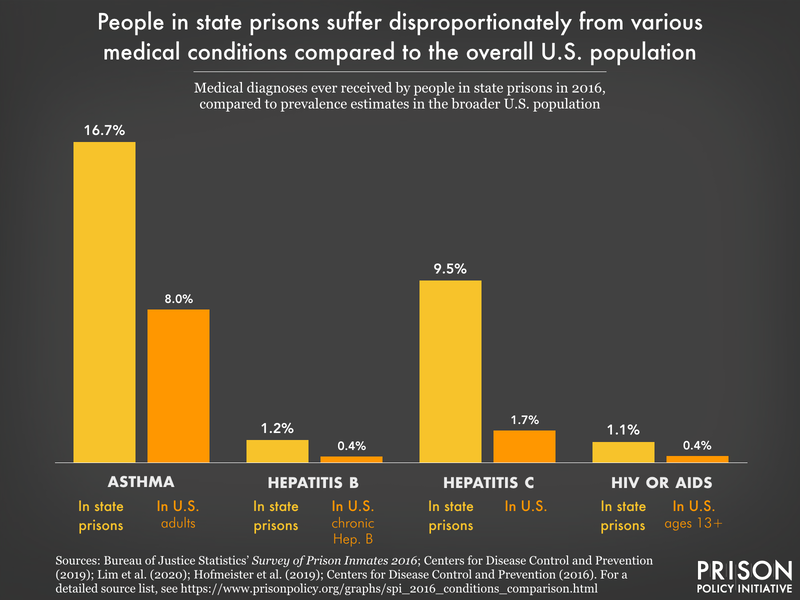New report, Chronic Punishment, reveals the unmet health needs of people in state prisons
June 22, 2022
A new report from the Prison Policy Initiative offers the most recent national data on incarcerated people’s health, and shows that U.S. state prisons are continuing to ignore the plight of people in their care. The report, Chronic Punishment: The unmet health needs of people in state prisons, examines the Bureau of Justice Statistics’s Survey of Prison Inmates and breaks down the prevalence of several chronic conditions in this country’s 1,566 state prisons. The report also takes a deep dive into the medical histories of people behind bars.
Key findings in Chronic Punishment include:
- People in state prisons suffer disproportionately from asthma, hepatitis C, HIV, and substance use disorder.
- Significant numbers of people in state prisons also suffer from illnesses such as heart disease, hypertension, and diabetes, which are exacerbated behind bars.
- Half (50%) of people in state prisons lacked health insurance upon the arrest that led to their incarceration, and those with insurance disproportionately received Medicaid, a sign that poverty, exclusion from the healthcare system, and incarceration overlap significantly in this country.

Other standout findings in the report suggest that state prisons, nationally, are not treating medical problems among incarcerated people:
- Four in 10 (43%) people in state prison report one or more diagnosed mental health conditions, and women’s rates are even higher. Yet only about one-fourth (26%) have received some sort of professional help for their mental health since entering prison.
- 19% of people in state prisons report having gone without a single health-related visit since entering prison.
- Existing research suggests that many people who go to prison die prematurely: Cancer is more deadly in prison than on the outside, and people recently released from prison have a higher risk of hospitalization and death from heart disease than the average person. In the first two weeks after release from prison, individuals face a risk of death that is more than 12 times higher than for non-incarcerated individuals.
The report, which includes 15 powerful data visualizations, analyzes how the typical individual in state prison lacked healthcare long before their incarceration and how prison doctors often diagnose problems that prisons lack the capacity to treat. The report takes a particularly close look at how incarcerated women fare medically, including a section about the treatment of people who are pregnant.
Chronic Punishment is the second installment in the Prison Policy Initiative’s analysis of the 2016 Survey of Prison Inmates, a national dataset released last year that offers the most thorough and recent demographic picture of people behind bars in the U.S. This report follows the Prison Policy Initiative’s recent report Beyond the Count about the adverse life experiences of people behind bars. The data cannot be disaggregated by state.
The full report is available at: https://www.prisonpolicy.org/reports/chronicpunishment.html



